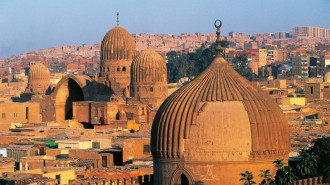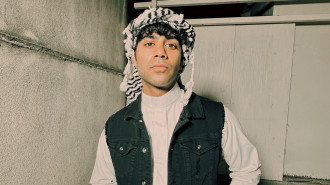
'No sign of Christmas in the birthplace of Jesus': As bombs rain on Gaza, Palestinian Christians say cancel celebrations

Last week, Nahida and Samar Anton — a mother and daughter — were reportedly shot dead by an Israeli sniper while walking inside the Holy Family Church, Gaza’s only Catholic church.
Beshara Shahin, a Palestinian Christian who left Gaza in 2015, knew these women.
“What did they do? They were not firing rockets,” Shahin said.
As Israel continues its bombardment on the Gaza Strip, Palestinian Christian leaders and municipal authorities have called off Christmas celebrations in light of the situation.
"There is not one single piece of decoration, let alone a lit tree. There are no wreaths, even. There's no sign of Christmas in Bethlehem, the birthplace of Jesus, and this is supposed to send a message around the world"
The Patriarchs and Heads of Churches in Jerusalem announced in November foregoing “unnecessarily festive activities” and requested funds for Christmas celebrations and decor go to humanitarian aid for Gaza instead.
“There is not one single piece of decoration, let alone a lit tree. There are no wreaths, even. There's no sign of Christmas in Bethlehem, the birthplace of Jesus, and this is supposed to send a message around the world,” Dimitri Diliani, head of the Palestinian National Christian Coalition, told The New Arab.
Despite social pressure, Palestinian Christians in the diaspora are also adhering to this call to refrain from Christmas festivities this year.
Shahin, who now lives in the United States, said he, along with other diaspora Palestinian Christians, are abiding by Palestinian Christian leaders, and not celebrating Christmas or New Year’s.
“We didn't do our Christmas tree or any decoration this year because we are in a state of mourning and sadness because of the genocide committed in the Gaza Strip,” Shahin said. “The whole celebration will be limited to just prayers in the church.”
|
An airstrike levelled Shahin’s Gaza City apartment a few weeks ago. The rest of his relatives — 17 members of his wife’s family — are sheltering in a church in Gaza after their homes, too, were bombed.
“We are all part of the Palestinian community in the Gaza Strip. And the Apache helicopter or the F15 [military equipment used by Israel] doesn't differentiate between Christian and Muslim"
With the internet cut off, Shahin can only reach his family through expensive telephone calls.
“We are all part of the Palestinian community in the Gaza Strip. And the Apache helicopter or the F15 [military equipment used by Israel] doesn't differentiate between Christian and Muslim,” Shahin said.
Leila, a Palestinian Christian living in the US and an organiser with the activist group, National Students for Justice in Palestine, said religious services are still occurring, but decorations, parties, and other celebratory events are cancelled in solidarity with their Gazan brethren.
|
|
“My family cannot in good consciousness participate in festivities which put consumerism over justice for Palestine,” Leila, who requested only her first name be used, said.
“We are boycotting the consumer culture that tends to dominate the holiday season and instead investing in our community and keeping Gaza at the forefront of our minds.”
This sentiment echoes the “Cancel Christmas” campaign launched on December 14 by international activists partnered with Community Peacemakers Teams for Palestine, an organisation supporting peace workers in conflict zones.
“They're praying for their lives, they're looking for food. They're looking for their children under the rubble. That's their Christmas”
The initiative aims to have a holiday without fancy dinners and gifts and to reduce Christmas spending in protest of the ongoing violence in Gaza.
|
“Christmas in Gaza looks like they have no churches because they are bombed. It looks like they are locked into churches, because otherwise they're bombed,” Stefanie Eisgrou, one of the campaign organisers, said.
“They're praying for their lives, they're looking for food. They're looking for their children under the rubble. That's their Christmas.”
Approximately 1,000 Christians are in Gaza, with half refugees or descendants of refugees from mainly Haifa, Jaffa, and Jerusalem and half indigenous to Gaza, according to Omar Haramy, director of the Christian organisation Sabeel Ecumenical Liberation Theology Center.
This number dwindled from 3,000 when Hamas took over in 2007. While the refugees are often concentrated in camps, indigenous Gazans are typically middle or upper-middle-class and own property.
Most of Gaza’s Christians are part of the Greek Orthodox faith, with smaller numbers worshipping at the Catholic Holy Family Church and the Gaza Baptist Church.
"It's not only a general genocide against all the population of Gaza, but there is a targeted attempt to eliminate the Christian presence in Gaza by the Israelis"
The Greek Orthodox Church of Saint Porphyrius is the oldest in the Gaza Strip, having originally been established in the 5th century.
Displaced and seeking safety, most of Gaza’s Christians huddled in the Anglican al-Ahli Arab Hospital, the Church of Saint Porphyrius, and the Holy Family Church.
On October 17, an explosion hit the hospital, killing 500 people, and two days later, an Israeli airstrike hit the Church of Saint Porphyrius, killing 18.
“It's not only a general genocide against all the population of Gaza, but there is a targeted attempt to eliminate the Christian presence in Gaza by the Israelis,” Diliani said, of the assaults against Christian institutions.
For Leila, the holiday season in the West feels disheartening and isolating, as she watches Christian communities around her continue with “business as usual” as violence rages in Christianity’s birthplace.
“Churches have held vigils for Gaza, but this is not enough,” Leila said. “We need to see actual, committed acts of solidarity and political action that go beyond empty messages of support for the Palestinian people.”
Jessica Buxbaum is a Jerusalem-based journalist covering Palestine and Israel. Her work has been featured in Middle East Eye, The National, and Gulf News
Follow her on Twitter: @jess_buxbaum




 Follow the Middle East's top stories in English at The New Arab on Google News
Follow the Middle East's top stories in English at The New Arab on Google News


